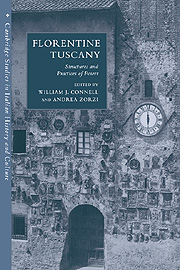Book contents
- Frontmatter
- Contents
- List of figures
- List of tables
- List of abbreviations of archival sources
- Introduction
- 1 The ‘material constitution’ of the Florentine dominion
- 2 The language of empire
- 3 Constitutional ambitions, legal realities and the Florentine state
- 4 Fiscality, politics and dominion in Florentine Tuscany at the end of the middle ages
- 5 Market structures
- 6 State-building, church reform and the politics of legitimacy in Florence, 1375–1460
- 7 The humanist citizen as provincial governor
- 8 Territorial offices and officeholders
- 9 Demography and the politics of fiscality
- 10 Florentines and the communities of the territorial state
- 11 Patronage and its role in government: the Florentine patriciate and Volterra
- 12 San Miniato al Tedesco: the evolution of the political class
- 13 The social classes of Colle Valdelsa and the formation of the dominion (fourteenth–sixteenth centuries)
- 14 Arezzo, the Medici and the Florentine regime
- 15 Rubrics and requests: statutory division and supra-communal clientage in Pistoia
- 16 A comment
- Index
- CAMBRIDGE STUDIES IN ITALIAN HISTORY AND CULTURE
2 - The language of empire
Published online by Cambridge University Press: 16 September 2009
- Frontmatter
- Contents
- List of figures
- List of tables
- List of abbreviations of archival sources
- Introduction
- 1 The ‘material constitution’ of the Florentine dominion
- 2 The language of empire
- 3 Constitutional ambitions, legal realities and the Florentine state
- 4 Fiscality, politics and dominion in Florentine Tuscany at the end of the middle ages
- 5 Market structures
- 6 State-building, church reform and the politics of legitimacy in Florence, 1375–1460
- 7 The humanist citizen as provincial governor
- 8 Territorial offices and officeholders
- 9 Demography and the politics of fiscality
- 10 Florentines and the communities of the territorial state
- 11 Patronage and its role in government: the Florentine patriciate and Volterra
- 12 San Miniato al Tedesco: the evolution of the political class
- 13 The social classes of Colle Valdelsa and the formation of the dominion (fourteenth–sixteenth centuries)
- 14 Arezzo, the Medici and the Florentine regime
- 15 Rubrics and requests: statutory division and supra-communal clientage in Pistoia
- 16 A comment
- Index
- CAMBRIDGE STUDIES IN ITALIAN HISTORY AND CULTURE
Summary
The Florentine statutes were based on Roman law and Florence regarded itself proudly as heir to Rome. As Leonardo Bruni boasted in his Laudatio of Florence, ‘your founder is the Roman people – the lord and conqueror of the entire world’ and since their ‘imperium was equal to the entire world … therefore to you also, men of Florence, belongs by hereditary right dominium over the entire world and possession of your parental legacy’. Dominion (dominium, dominio) was the word used by the Florentines to describe their growing state at this time; and, although Bruni tells us that no one, after seeing the city, failed to believe that Florence was capable of acquiring ‘the dominion and imperium of the whole world’, he was careful not to lay claim to imperium by hereditary right. For Florence was still legally subject to the German emperor, and to have described its state as an empire would have been tantamount to laesa maiestas. Since Bruni was also laying claim to Florence's republican inheritance from Rome, he was equally careful to stress that the city was founded ‘when the imperium of the Roman people was at its peak’ – that was before the Caesars and their successors had deprived the Romans of their liberty, hence Florence's own inherited love of freedom and hatred of tyranny.
- Type
- Chapter
- Information
- Florentine TuscanyStructures and Practices of Power, pp. 32 - 47Publisher: Cambridge University PressPrint publication year: 2000
- 1
- Cited by



